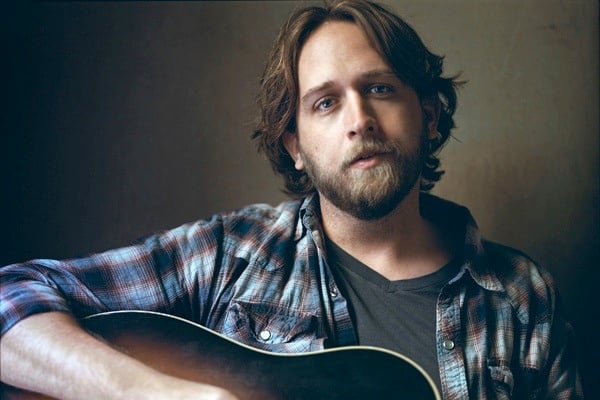Hayes Carll is performing at the Birchmere tonight. Photograph by James Minchin
Texas trobadour Hayes Carll’s fourth album, KMAG YOYO, released at the beginning of this year, solidified his spot as one of the most versatile country singers in the game, capable of conjuring a laugh as easily as a tear—sometimes within the same four-minute song. By the time 2011 winds down, he’ll have played more than 200 dates in support of that album, including tonight’s concert at the Birchmere.
The Washingtonian caught up with the 35-year-old singer-songwriter before a performance in Massachusetts last week to discuss the books and music he’s been relying on for company on the road, the curious nature of memory, and the inspirational power of a fresh notebook.
I was pleasantly surprised by the generous length of the set you played here in DC at the Rock and Roll Hotel back in July. It was a little more than two hours, I think, and there were songs I was expecting to hear that you didn’t play. It really demonstrated the strength of your catalog.
When I started out, I’d play covers for four hours a night. I have no desire to go back to doing that. But by the time you get up there and warmed up and feel out the crowd and finally start having a good time, an hour has gone by already, and you still have a lot of songs you want to play. So we generally do around two hours, and if I see people starting to hit the exits, I’ll wrap it up. But that’s the fun part of our day: getting up on stage. I like to make it last.
Can you write songs when you’re on the road, or do you have to dedicate time for that when you don’t have a rigid schedule and places to be?
I’m not very good at doing it on the road. I get most of my ideas while I’m traveling. You have all these people and places, all this input constantly. I’ll just jot down a line or something. I have to have peace and quiet to write. I just try to soak up all the ideas while I’m out here, and then I go home and try to turn them into something.
Since you’re married, is your wife one of the people who gives you feedback on new songs you’re working on?
Somewhat. She’s been there since before I had a gig of any kind. [Laughs.] She was in a working band long before I was. From the beginning, she’s always been a really good litmus test. I don’t do it a whole lot, though. More than anything, I’ll play [a new song] live. That, to me, is the best measuring stick of whether it works or not.
What have you been reading and listening to on the bus this tour?
On this run, all I’ve been doing is watching Breaking Bad. I’m on season four, rifling through that right now. I’ve been listening to that Nick Lowe record The Convincer. And a Canadian buddy of mine, Corb Lund; I’ve been playing his stuff. I got a Bloodshot Records compilation the other day in Chicago. I’ve been enjoying that.
On the book front, I started Keith Richards’s autobiography [ Life], but I haven’t got very far. When I got the book, I tweeted about how lugging that massive thing through the airport was slowing me down. Everyone told me I needed to get the audio. I may change course mid-stream and pick that up.
When I read it, I was struck—even allowing for embellishment or artistic license or whatever—by how vivid Richards’s memories are, even of his very young childhood. Do you feel, as a writer yourself, that such a degree of observational acumen and recall is innate? Or do you think it can be learned?
I don’t know. Certain things are going to last with you. I can’t remember what I had for dinner or where I played three nights ago, but I’ll always remember my birthday party when I was seven. I don’t know if that’s because of the lifestyle that I have, where every night I’m in a different city, or because your youth and growing up and your family is just more impactful.
When I was in high school, I always thought—you know, when you’re fighting with your parents and nobody understands you and you’ve got all this inner turmoil going on—I thought, I should keep a journal of this. Not just the day-to-day shit, but how I’m feeling and how I perceive what other people do. With the idea that someday I was going to be on other end of it, trying to talk to my kid, and everything I said was going to piss him off. I have an eight-year-old, and I have a hard time putting myself in his place and relating to him. I think, I’ve got a cool job; I’m a cool dad. Why would he have a problem with me? But it’s about a lot more than that. I wish I had followed through and documented all that.
Do you keep a journal now?
I’m pretty bad about it. I have a certain embarrassment over my own writing. It’s odd, because it’s the thing that no one will ever see. There’s something about putting down my thoughts and feelings in a journal. I immediately self-edit, which sort of defeats the purpose. So I’ll give it a go and then put it down for six weeks.
I’m an obsessive notebook collector, though. Notebooks and pens. It’s my idea of a clean start. Whenever I want to work on anything—whether it’s a to-do list or a journal or a new songs—I’ll go to Office Max. That’s really my nirvana. That first page is a blank slate. There always seems to be some control in that, like, “I can do better with this notebook.” As a result, I have a house full of thousands of notebooks, and each one has four pages of shit in it.
Those nice Moleskine notebooks are especially good at inducing that optimism.
Yeah, the exterior is nice and significant and has weight, and therefore the stuff that goes in it should match it—and has the potential to! And then you get started and you think, God, this is not worthy of its cover. I have a pretty expensive closest full of nice notebooks.
Hayes Carll performs tonight at the Birchmere. Doors open at 6 PM; the show starts at 7:30. Tickets ($25) are available through Ticketmaster.
















